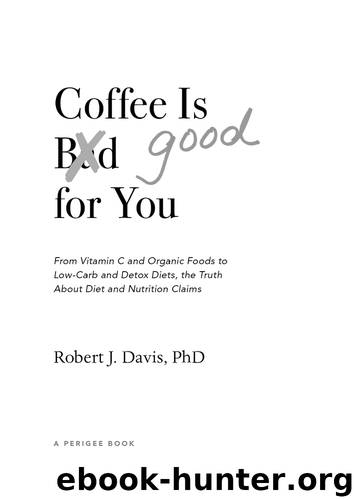Coffee is Good for You by Robert J. Davis

Author:Robert J. Davis [Davis, Robert J.]
Format: epub
ISBN: 9781101553992
Publisher: Penguin Group US
Published: 2012-01-02T16:00:00+00:00
MOST OF US NEED MORE VITAMIN D
For journalists, it’s sometimes surprising what pushes our readers’ buttons. Take, for example, a 2010 New York Times article that elicited more than 300 online comments, many of them angry. “Boo, hissssss,” “absolutely ridiculous,” “patent hogwash,” and “stupid, false, and a total pack of lies” were typical of the responses. (And, of course, the obligatory “This reporter should be dismissed immediately.”)
What riled this virtual mob so much wasn’t abortion, the Middle East, or the federal deficit. It was a study on vitamin D. The scientific report, issued by a panel of experts assembled by the Institute of Medicine (IOM), flew in the face of what we’ve repeatedly heard—that most of us need more vitamin D to protect against an array of conditions.
In fact, many studies do suggest that higher levels of the vitamin might be beneficial. But the history of vitamin supplements such as B, C, E, and beta-carotene—which were initially hailed as lifesavers but then proven ineffective and possibly even harmful in clinical trials—is a good reason for caution until there’s more proof.
Doctors have long known that a deficiency of vitamin D can lead to rickets, a bone disorder in children. There’s also good evidence from randomized trials that a vitamin D intake of about 800 international units (IU) per day (the current recommendation for people over age 70) reduces the risk of fractures and falls in older people.
As for other benefits, the research is less conclusive. For example, cohort studies have linked low blood levels of vitamin D to a higher risk of heart disease and cardiovascular-related deaths. But there’s a dearth of randomized studies on the subject, and the few that have been conducted don’t show that vitamin D supplements protect against heart disease or strokes.
For cancer, the science is similarly incomplete. Case-control and cohort research has found an association between low vitamin D levels and an elevated risk of colorectal cancer, but to date, there’s no proof from large clinical trials that vitamin D pills can ward off the disease. And while one randomized study did find that women taking vitamin D and calcium had lower rates of breast cancer, cohort studies have generally turned up no link to breast cancer.
Other research raises the possibility that vitamin D could reduce the risk of multiple sclerosis, diabetes, and premature death. But there’s also a potential dark side to D: Studies show that people with very high levels are at increased risk of prostate and pancreatic cancer.
So what’s the optimal level? The IOM’s panel of experts concluded that a blood level of 20 nanograms per milliliter (ng/ml)—a threshold most people now meet—is sufficient to protect bones and that there are not enough hard data to make recommendations about other possible benefits. But other scientists think the magic number is 30 ng/ml or higher—a standard that would require most of us to take a supplement.
There’s broader agreement that certain people, including those who are African American, elderly, or obese, or who have limited sun exposure, may need a supplement.
Download
This site does not store any files on its server. We only index and link to content provided by other sites. Please contact the content providers to delete copyright contents if any and email us, we'll remove relevant links or contents immediately.
Nutrition for Sport, Exercise, and Health by Spano Marie & Kruskall Laura & Thomas D. Travis(3745)
Nutrition for Sport, Exercise, and Health by Marie Spano & Laura Kruskall & D. Travis Thomas(3708)
The Sprouting Book by Ann Wigmore(3565)
Flavor Flours by Alice Medrich(2837)
Superfood Smoothie Bowls: Delicious, Satisfying, Protein-Packed Blends that Boost Energy and Burn Fat by Chace Daniella(2426)
Memory Rescue by Daniel G. Amen(2400)
Dirty Genes by Ben Lynch(2296)
The Bad Food Bible by Aaron Carroll(2247)
Genius Foods by Max Lugavere(2194)
The Poisoner's Handbook by Deborah Blum(2114)
Good Calories, Bad Calories by Gary Taubes(2090)
The Main Street Vegan Academy Cookbook by Victoria Moran(2057)
The I Quit Sugar Cookbook by Sarah Wilson(2022)
Core Performance Essentials by Mark Verstegen(1996)
Memory Rescue: Supercharge Your Brain, Reverse Memory Loss, and Remember What Matters Most by Amen Dr. Daniel G(1965)
Big Girls Do It Stronger by Jasinda Wilder(1925)
Android App Development by Franceschi Hervé J.;(1830)
Sugar Crush by Dr. Richard Jacoby(1787)
Dr. Colbert's Keto Zone Diet by Don Colbert(1638)
